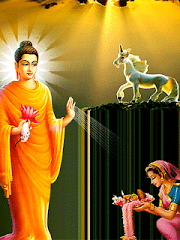| 21. Buddhist Education. It is a method of teaching that is based on the mental development of the individual: The primary object of Buddhist Education is to produce a cultured disciplined and educated society. With that object in view the first university to be established in the world was at Nalanda in India. It is reported that over ten thousand well disciplined, cultured and law abiding students had their education there in addition to the numerous lecture halls found there classes were also held in the open air under the cooling shade of trees. |
| 20. Buddhist Economic System. Many who are not familiar with the Buddha's Teaching classify it as a religion for the next world, or for a future life. They are completely mistaken in this, because eighty percent of the objectives included in the Buddha's Teaching are for the world of today. According to the Buddha all except one of the five blessings that accrue to the virtuous are available in this life itself; ten of the eleven benefits obtainable through the development of Metta (loving-kindness) are immediate. One who leads a good life in this world is certain to be happy in the next. The Buddha emphasises this in His Teachings. Thus the Buddha who taught the way to the cessation of suffering also pointed out the path to a highly satisfactory way of life on earth. One aspect of this mundane progress refers to an economic system based on Buddhist principles with the objective of economic development together with the elimination of poverty. The Buddha defines righteous employment as engagement in agriculture, trade, dairy farming, defence services, government services and professional services. He prohibited trade in weapons, in slaves, in rearing animals for slaughter, in liquor, and in poisons, drugs and narcotics. |


.gif)




ไม่มีความคิดเห็น:
แสดงความคิดเห็น